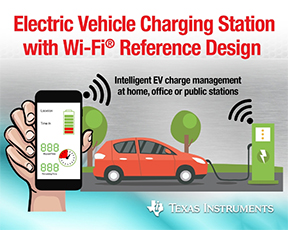 Texas Instruments (TI) has introduced the first reference design that adds Wi-Fi connectivity to an electric vehicle (EV) charging station. Electric vehicle owners will now be able to remotely monitor and control the charging of their vehicles from just about anywhere with Wi-Fi, presenting dozens of potential use cases from home automation to checking the availability of nearby public charge points.
Texas Instruments (TI) has introduced the first reference design that adds Wi-Fi connectivity to an electric vehicle (EV) charging station. Electric vehicle owners will now be able to remotely monitor and control the charging of their vehicles from just about anywhere with Wi-Fi, presenting dozens of potential use cases from home automation to checking the availability of nearby public charge points.
Battery technology advancements and government regulations have resulted in a growing number of new electric vehicles around the world. But vehicle makers still need more charging stations to make it easier for drivers to charge their vehicles. The new reference design uses TI’s SimpleLink Wi-Fi wireless microcontroller (MCU) technology that allows design engineers to create stations that intelligently charge at non-peak times or detect and communicate when a charging station is available.
One barrier to widespread EV charging station adoption is the amount of time it takes to charge a vehicle. The reference design supports Level 1 charging, which is compatible with household outlets, as well as Level 2 EV charging, which helps vehicle owners tap into higher current (15A to 30A and higher) connections available in commercial office buildings. Level 2 chargers typically take up to eight hours to fully charge the vehicle if the owner wants to plug it in while at work.
Later this year TI plans to introduce a Level 3 EV direct-current charger reference design scalable to 600V and 400A that cuts charging time down to only 20 to 30 minutes, enough time to stop at a Wi-Fi enabled restaurant that has a charging station and charge the vehicle during lunch.
TI accelerates innovation for electric vehicles and EV charging stations with its comprehensive portfolio of embedded processors and analog technologies, proven system expertise and reference designs focused on faster time to market. Advancements in TI’s battery management, current sensing, power management, analog signal chain and microcontroller products are leading to lighter electric and hybrid vehicles that can travel longer distances without the need to recharge. And once they do, TI helps make charging more convenient by enabling smarter stations that charge faster than ever before.







